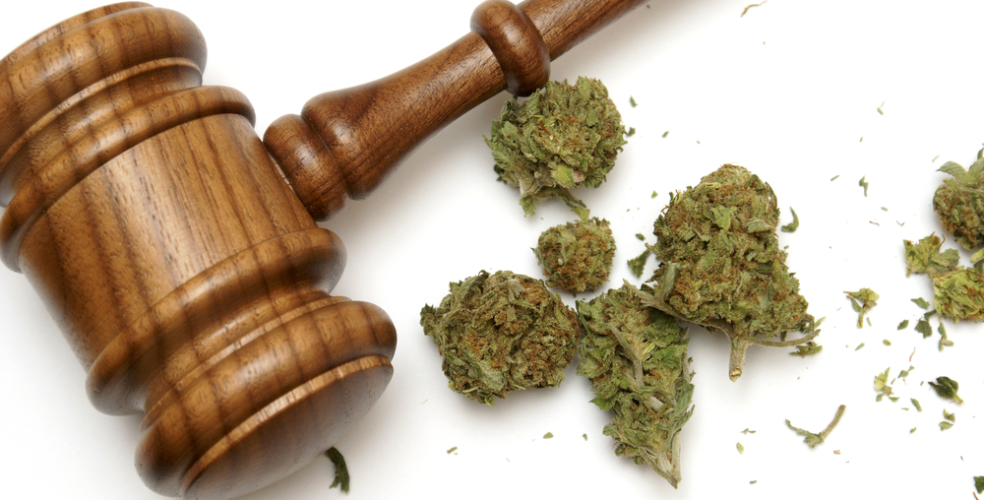Victory never tasted so dank.
For some time, Nebraska and Oklahoma have tried to sue Colorado based on its recreational marijuana laws because the two state's say they can't control the flow of our marijuana in and out of their own states themselves. Today, the SCOTUS finally announced its verdict: Hell no.
In the lawsuit, Nebraska and Oklahoma (what the f*ck is wrong with them?) blatantly uses Colorado as a scapegoat for their own problems with weed. Recreational pot, they argue, has increased interstate trafficking and illegal drug use on their sides of the border. Citing the example of Chappell, Nebraska, a tiny town just seven miles north of the Colorado border, where felony marijuana arrests skyrocketed 400 percent in 3 years, the 2 states plead the case that it was us, not them, who was causing these problems.
The lawsuit also makes the threatening assertion that Colorado has no authority to pass laws that conflict with the federal prohibition on marijuana. By legalizing weed, the states claim, Colorado is violating the Supremacy Clause of the U.S. Constitution.
"The State of Colorado has created a dangerous gap in the federal drug control system," the lawsuit whines. "Marijuana flows from this gap into neighboring states, undermining Plaintiff States' own marijuana bans, draining their treasuries, and placing stress on their criminal justice systems."
"We can't afford to divert resources to deal with Colorado's problem," Nebraska Attorney General Jon Bruning says.
Of course, Colorado doesn't have a problem with illegal weed anymore. Neither do the 5 other states touching Colorado's borders. Nebraska and Oklahoma are the only ones with an issue, and it's not up to Colorado to solve it.
Long story short, this stupid, stupid case sat in the Supreme Court queue for 15 months, awaiting the justice's decision as to whether or not they'd hear the case.
Ruling that the interstate beef should be sorted out between the three states without their divine intervention, the Supreme Court has flat out refused to hear Nebraskahoma's case against Colorado. Instead, like tired parents, SCOTUS rolled their eyes, threw their hands up, and suggested the states sort out the issue by going through one or more of the lower courts first. Currently, it's unclear which one, if at all, Nebraska and Oklahoma will bring the case to, but at this point, legalization advocates are saying the Supreme Court's decision should promt the Plaintiffs to "reconsider their approach."
This is great news for Colorado, where the exploding marijuana industry could have easily been derailed by a Supreme Court decision in favor of Nebraskahoma. However, their case was weak, and it's easy to see why the Supreme Court didn't want to get involved.
After all, Colorado is not responsible for the behavior of individual purchasers as it already prohibits interstate commerce of marijuana and requires background checks for all growers and vendors.
"At the end of the day, if officials in Nebraska and Oklahoma are upset about how much time and resources their police are spending on marijuana cases, as they said in their briefs, they should join Colorado in replacing prohibition with legalization," Tom Angell, the chairman of the Marijuana Majority, says in a statement. "That will allow their criminal justice systems to focus on real crime (for example Oklahoma's exploding meth problem) and it will generate revenue that can be used to pay for healthcare, education and public safety programs."
Colorado officials also had a point in their defense when they argued that the case was invalid because Nebraska and Oklahoma were inappropriately trying to influence what voters in the Centennial State had decided for themselves.
"Colorado does not intend, nor has it attempted, to reach across the border to invade the plaintiff states’ sovereign rights," the state of Colorado said in its brief seeking to have the challenge dismissed. "Indeed, it is Colorado’s sovereignty that is at stake here: Nebraska and Oklahoma filed this case in an attempt to reach across their borders and selectively invalidate state laws with which they disagree."
Touché. Plus, you don't see Colorado going around trying to inappropriately influence the legislation of other states. Tattoos were illegal in Oklahoma for the longest time, but you didn't see us stomping over there and asserting that body modification was a human right and an individual choice the government shouldn't be involved in.
And while the Supreme Court's dismissal of the case doesn't necessarily signal their agreement or disagreement with Colorado's defense, it's still nice to see that they're leaving petty legalization bitch fights up to the states, at least for now. Because, after all, pot is still federally illegal. If it's made into a federal issue, it's much more vulnerable at this point in our political landscape than it is as a state thing. That, and the dismissal of this case sets the somewhat comforting precedent that what one state chooses to do is not always other state's business.
We're looking forward to seeing if Nebraska and Oklahoma have any fight left in them after this, but for now, we're just going to keep taking advantage of our legal rights while they figure out a way to deal with their weed problem like adults.





Leave a Reply
You must be logged in to post a comment.